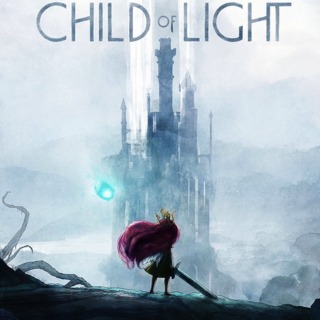Child of Light is exceptional as a checklist. The watercolor visuals (Yes, that is actually watercolor) evoke childhood fairy tales, epic iconography, and a touch of impressionism. The music captures the grandeur you'd expect out of those visuals while never forgetting the plight of a lost child. The combat is well executed on its own, pulling off a menu-based system not seen since Grandia while never cluttering up the screen with too many icons. However, we experience games as a whole rather than as a sum of their individual parts and Child of Light's pieces too often clash.
The game initially appears to be a downer. You play as Aurora, a young daughter of a duke of Austria who dies and then awakes on an altar in a distant land. The relationship between the real world and the fantasy world of Lemuria seems to be similar to how it works in The Lion, The Witch and the Wardrobe except the “wardrobe” entrance is lost. Nearly all of your early encounters are with savage woodland creatures and ghouls hiding in dark caves. The voices are disembodied ones only beckoning you further in. You do soon meet a firefly (or perhaps a child's imagining of what a firefly would be like) as a guiding light and then some more companions later on, but the tone is dreary with the occasional bright spot.
The audiovisual design is what compliments the core concept of a young girl being forced to grow up. The backgrounds are mostly static 2D art that show how Ubisoft's engine can really bring together concept artists and the final game. Subtle and deliberate animations to these backdrops highlight the theme to each area while always playing around with the notion of time. The music is mostly somber but it is also responsible for most of the encouragement you get in the game, always providing just enough hope. Again, your eyes and ears will be very satisfied.
The problem is that much of the game goes against the almost-romantic tumult of the story and audiovisuals. For example, the dialogue distances the player from the characters because of a playful rhyming scheme. Oftentimes it doesn't work and you can almost hear the writer straining to get across periphery information while keeping the rhyme rolling. Even when it's not so forced, poignant moments like when a companion's prose finally comes together with the presence of their sibling are few and far between. It's more often either a case of the writer talking instead of the characters or the game just coming off as silly.
The combat does better on its own. You and one of your companions line up to trade attacks with the dark creatures of the world like in many other RPG's. It's a fun system too, offering the classic attack/magic/item options to either do damage or manipulate a progress bar on the bottom of the screen that indicates the rate and timing of all combatants' turns. Will you take the time to fire off a stronger attack and risk getting interrupted, defend and try again next turn, or sneak in a quick but weaker attack? There is always a rational decision to make and the game pauses to let you make it.
The problem is that Child of Light isn't a rational dissection of growing up. It's built on big tonal shifts in key phases of Aurora's metamorphosis into adulthood. She doesn't weigh the pros and cons of maturing just like leveling up is never a decision; it just happens due to the situation. It's an emotional experience and Ubisoft Montreal never looks to capitalize on the perspective provided by the distance they create. The result is that key moments in the game fall flat.
So while I won't go so far as to call Child of Light a bad game, I can't really call it a good one either. A lot of talent went into the game and likely a lot of passion too because Ubisoft could have made an expansion to Far Cry or Assassin's Creed and sold more copies than they will with a salute to Japanese RPG's. Still, it feels like all that talent needed more direction. A lot of these developers were actually working on giant projects like Far Cry and Assassin's Creed which had a lot of different leaders dedicated to their own individual parts of the games. The scale of the project went down with Child of Light, but my uninformed suspicion is that the structure of the development team stayed the same. It's a small game that feels like a much bigger one.

